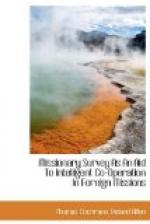It is this purpose or end which decides what is to be included and what is to be excluded from the survey. If, for instance, we are making a survey of the acoustic properties of church buildings in England, it is not scientific to introduce questions as to the character of the gospel preached in them. A scientific survey is not necessarily a collection of all possible information about any people or country; that is an encyclopaedia; a scientific survey is a survey of those facts only which throw light on the business in hand. A scientific survey of foreign missions ought not then necessarily to look at the work carried on from “every point of view”. The point of view must be defined, the end to be served defined, and then only those factors which throw light upon that end have any place in a scientific survey. We cannot be too clear about this, because in survey of a work so vast and so many sided as foreign missions we might easily include every human activity, unless we defined beforehand the end to be served and selected carefully only the appropriate factors. Carefully defined, missionary survey is not the unwieldy, amorphous thing which people often imagine. There is indeed a dangerous type of survey which starting with a hypothesis proceeds to prove it by collecting any facts which seem to support it to the neglect of all other facts which might disprove it. The procedure advocated here is the adoption of a definite and acknowledged purpose for which the survey is to be made and the collection of all the facts which bear upon the subject in hand. The facts are selected, but they are selected not by the prejudices or partiality of the surveyor, but by their own innate and inherent relationship to the subject.
A scientific survey can only be a collection of facts; but inferences will certainly be drawn from the facts which will direct the policy of those who administer foreign missionary societies. The drawing of these inferences from the material collected must be carefully distinguished from the collection of the material (i.e. the making of the survey). The latter precedes the former and is independent of it. Inferences hastily drawn, or prematurely adopted, would only tend to discredit missionary survey as a means to the attainment of truth. The adoption of a hypothesis and the making of a survey in order to prove it by a careful selection and manipulation of facts would not discredit survey as a means to the attainment of truth; it would only discredit and debase the moral character of the man who made such a survey.
2. The survey here treated of is missionary survey, that is to say, it treats of missions and is governed by a missionary purpose. And it is a survey of Christian missions; therefore it is governed by the purpose of spreading the knowledge of Christ. This statement is of great importance and needs to be carefully conned before it is accepted, because by it missionary survey will be distinguished from




